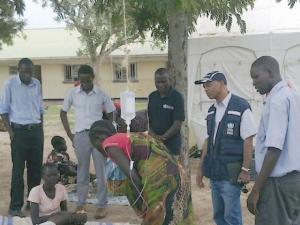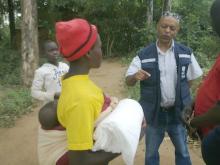Uganda about to achieve universal coverage for long lasting insecticide treated nets
Kampala, 26th June 2014:- Uganda is set to achieving universal coverage of Long Lasting Insecticidal Nets (LLINs) which is expected to drastically reduce the malaria infection. Presently, the Ministry of Health with support from Global Fund, Presidential Malaria Initiative (PMI) and World Vision is distributing of 21 million LLINs country wide in order to achieve universal coverage.
Universal coverage means one net per every two people in a household. In order to bring malaria down, the people should sleep under these nets consistently every night. For operational purposes, the country’s 112 districts were divided into clusters also known as “waves” comprising 15-16 districts. Each wave was handled separately to ensure total coverage. Overall, 8 waves have been implemented reaching approximately 36,000,000 people. The central business districts of Wakiso and Kampala with an estimated 4,000,000 population are going to be handled last given their unique urban set up.
This LLIN campaign involves registration of people in each and every household, to ascertain the actual beneficiaries, sensitizations of district and community leaders and training of distributors. The overall oversight of the exercise is provided by the National Coordination Committee (NCC) chaired by the Director General of Health Services.
In June Dr Wondimagegnehu Alemu, the WHO Country Representative in Uganda, participated in a field supervision and observed LLIN distribution in wave 8 in west Nile sub regions in his capacity as a member of the National Coordination Committee and Country Coordination Mechanism (CCM) of Global Fund. He visited a number of LLIN distribution points and interacted with community members on the exercise emphasizing the need to use the nets every night. He reminded them that other preventive measures including keeping their homesteads clean by slashing bushes near homes, draining water bodies that could serve mosquito breeding site and always to visit nearby health units for testing and early treatment should they experience signs and symptoms of malaria.
Dr Alemu also addressed the District Task Force highlighting the need for district leadership to continuously sensitize the community on malaria prevention especially regarding net use. He also underscored the need for pregnant women to use intermittent preventive treatment (IPTp) and the importance of Indoor Residual Spraying (IRS). He stressed the multipronged and multisectoral nature of malaria prevention and control interventions.
At RHINO refugee camp, Dr Alemu and his team met a child with severe malaria on anti-malarial treatment under a tree. This brought out the urgent need to improve infrastructure at the camp and for that Dr Alemu pledged to gunner further support for the camp from the Health development partners.
Before ending the mission, the WHO team participated in the regional sensitization meeting of the 5 west Nile districts.
________________________________________________
For more information please contact:
Benjamin Sensasi, Health Promotion Adviser
WHO Country Office
Tel 256-414-335500
Email: %20sensasib [at] who.int ( sensasib[at]who[dot]int)




